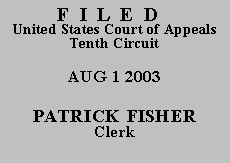

| UNITED STATES OF AMERICA,
Plaintiff-Appellee,
v.
DANA HOWARD MULLEN, also
known as Stacey Allen Mullen, also
known as Alex R. Johnson Defendant-Appellant. |
No. 03-4013
(D.C. No. 02-CR-53-TC) (Utah) |
The pertinent facts as found by the district court, see rec. vol. I, doc. 47 at 2-4, are as follows. Two police officers were observing a residence known to be frequented by drug runners. They intended to conduct a "knock and talk" with the owner of the residence to determine if either of two individuals, whose cars were parked outside and for whom outstanding warrants existed, were present. Another officer waited in the backyard of the residence in case anyone fled through the back door. As the officers approached the house, Mr. Mullen came out and began to walk around the side of the house. When he ignored the officers' requests to stop and speak with them and then broke into a run towards the other side of the residence, they followed him and requested the officer in the back of the house to stop him. Mr. Mullen continued to run and along the way dropped two bags he had been carrying. When Mr. Mullen tripped and fell, one of the officers handcuffed him. Meanwhile another officer picked up the bags Mr. Mullen had dropped. As that officer walked toward Mr. Mullen, Mr. Mullen announced "The gym bag is mine; the fanny pack is not." Id. at 4 (citing hearing transcript at 31). An officer asked him "Whose fanny pack is it?" Mr. Mullen responded, "I know whose it is, but I don't want to tell you, but there's a gun in it." Id. (citing hearing transcript at 36). After verifying the outstanding warrants, the officers arrested Mr. Mullen. At the hearing on the motion to suppress, when asked about the ownership of the fanny pack, Mr. Mullen initially said "I guess I owned it. I had it in my possession," but later stated that the pack was his but he did not know what was in it, id. (citing hearing transcript at 40-41).
Two conditions must be met before Miranda warnings are required. The suspect must be in custody, and the questioning must meet the legal definition of interrogation. United States v. Perdue, 8 F.3d 1455, 1463 (10th Cir. 1993). Under Miranda, the term "interrogation" "refers not only to express questioning, but also to any words or actions on the part of the police . . . that the police should know are reasonably likely to elicit an incriminating response from the suspect." Rhode Island v. Innis, 446 U.S. 291, 301 (1980). The Fifth Amendment does not bar the admission of volunteered statements which are freely given. Miranda, 384 U.S. at 478.
Based upon its findings of fact as outlined above, the district court determined that although Mr. Mullen was in custody at the time he made the statement, he was not under interrogation as that term is defined in the context of Miranda. Particularly in light of the fact that Mr. Mullen did not argue for suppression of his first statement regarding ownership of the two bags, the district court found that "Officer Millard's question - 'whose fanny pack is it?' - was not designed to elicit an incriminating response concerning the Defendant." Rec. vol. I, doc. 47 at 8. Mr. Mullen had already disavowed ownership of the fanny pack, so the question attempting to establish another person's ownership was not one the police should have thought reasonably likely to elicit an incriminating response. Furthermore, as the district court also noted, the statement was not in fact a response to the officer's question. The officer asked only about ownership of the fanny pack. Mr. Mullen stated his refusal to provide that information and volunteered instead the information concerning the contents of the fanny pack.
The district court correctly cited our opinion in United States v. Gay, 774 F.2d 368, 379-80 (10th Cir. 1985), where we held it would be unreasonable to hold officers accountable for unforeseen answers to straightforward questions. See also Innis, 446 U.S. at 301-02 ("since the police surely cannot be held accountable for the unforeseeable results of their words or actions, the definition of interrogation can extend to words or actions on the part of police officers that they should have known were reasonably likely to elicit an incriminating response") (emphasis in original). We find no error in the district court's determination that the statement was not the product of interrogation, and we agree with the court's ultimate legal conclusion that there was no Miranda violation.
Accordingly, we AFFIRM.
ENTERED FOR THE COURT
Stephanie K. Seymour
Circuit Judge
*.After examining appellant's brief and the appellate record, this panel has determined unanimously that oral argument would not materially assist the determination of this appeal. See Fed. R. App. P. 34(a)(2) and 10th Cir. R. 34.1(G). The case is therefore submitted without oral argument. This order and judgment is not binding precedent, except under the doctrines of law of the case, res judicata, or collateral estoppel. The court generally disfavors the citation of orders and judgments; nevertheless, an order and judgment may be cited under the terms and conditions of 10th Cir. R. 36.3.